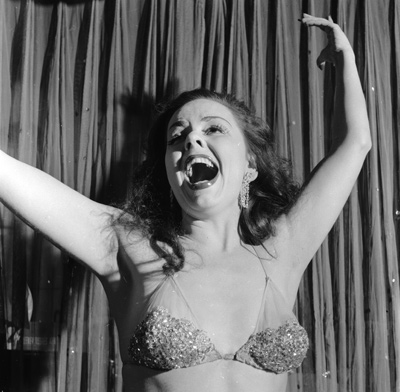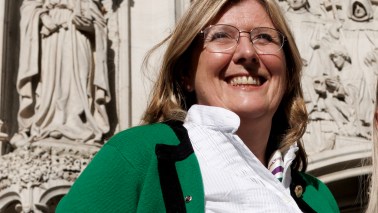A female friend asked me to a burlesque night she had organised. She honestly thought I would enjoy it. ‘Come and see naked women who aren’t being exploited,’ she said.
My friend said this because I sometimes hide from the world in the dark caves of Hackney, where ladies collect pounds in a pint glass and then turn around a pole with all the joie de vivre of a rusty weathervane in a light gale. On a wet weekday afternoon there are typically six or seven punters in these stews, who half-watch the show while drinking lager, munching crisps and thumbing through Loot or watching the cricket on the screen in the corner. I like these places. Flesh, alcohol, crisps, cricket, literature — the five pillars of civilised manhood, all accessible from one bar stool. Sometimes there’s even a working loo. It’s so much better than burlesque.
I shouldn’t have to see burlesque. Dita Von Teese, the American queen of the genre, has made it clear that it’s really just for women. Seventy per cent of her audience are women, apparently; the rest are gay men and boyfriends dragged along. So I ought to be able to leave this type of nudity to the people who understand it, but I am a stand-up comedian, so sadly it’s unavoidable in my line of work.
If I play a ‘variety’ night, there’s burlesque. At every taster show or chat show at the Edinburgh Fringe, there’s burlesque. I went to a fundraiser for International Women’s Day; there was burlesque. At every summer festival there’ll be a cabaret tent, and for cabaret you can pretty much read ‘burlesque’. Burlesque, it seems, has become the curry powder of light entertainment.
But my friend wanted company so I faced it again, with its camiknickers and sequins and women doing that ubiquitous ‘Aren’t I cheeky?’ face while taking an awfully long time to get undressed. Once again I found myself confronted with the fact that I must be some gross specimen of a man because I was still trying to find it erotic. Two hundred other men were, apparently, seeing art, beauty, postmodernism and ‘a power-play possession of the voyeuristic gaze’, just like it said in the brochure. I could just see tits; tits that had been desexualised by choreography and rehearsal. She takes this off, she winks at him, she shuffles to the side, she performs a sleight of hand that takes her bra off. The armour of familiarity — boredom, even — is so thick that none of the women seemed to exist in the moment of disrobing, and so trying to enjoy their nakedness was like trying to enjoy aircraft food. It was a tasteless encounter. I found myself thinking what it must be like to gaze upon a beautiful corpse.
This analogy delighted my friend. ‘I’m organising gore-lesque next,’ she said. Gore-lesque, she explained, further desexualises itself by having the performers pretending to slash each other’s wrists in a frenzy of stage blood. By showing how objectified women end up, she explained, it makes objectification impossible. ‘You would literally have to be a psychopath to enjoy it sexually.’ I felt sad. Had my humble little skin-pit on Old Street driven women to this?
Well, we needn’t worry. The sort of place I like will disappear soon. My burlesque–loving friend is a vocal member of the campaign to have strip clubs abolished in Hackney. ‘Women control burlesque,’ she says. ‘Men control lapdancing.’
She railed against Camden council, too, when it tried to have burlesque licensed along with traditional nudity back in 2009. While I appreciate that burlesque has a different purpose to a strip club, the two are not heaven and hell. The burlesque artist Gwendoline Lamour wrote in Time Out of the ‘unsophisticated brutishness’ of the men who frequent strip clubs, adding that to license burlesque would disenfranchise venues and performers, ‘leaving yet more room for the yob culture to thrive and flourish’. Even as an unsophisticated brute, I wondered at the idea that, without the synthetic antivenin of burlesque, we would all be poisoned by testosterone. Sex for money is bad: we must overwhelm it with ironic sex for money. We must fumigate every corner with irony.
In the end Camden gave in. Now licensed pole-dancing is pretty much dead, while unlicensed burlesque is a feathery, corseted plague. The idea that it’s good for women is taken as received wisdom; in 2010 Gok Wan made an overweight, fragile lady perform burlesque on television in order to empower her, and it seemed oddly normal, as if burlesque were occupational therapy for the timid.
Last year when Beatrix Von Bourbon made it to the semi-finals of Britain’s Got Talent, I felt that all was lost. Meta-nudity had broken out of the middle-class laboratory and was infecting the people. Soon every village would have a burlesque club where the Post Office used to be. Yet it was a revelation. The format prevented Beatrix from slithering away under a blackout as most performers do. She had to stand there — naked, sweating, anxious; suddenly human, asking two men and two women for their approval. I’ve taken all my clothes off. Is that good enough? Amanda Holden told her that her knickers were the wrong colour.
Of course it’s not good enough. It’s not supposed to be. The argument that most performers do it for fun rather than money should madden, not soothe us. Stripping should be the preserve of students, immigrants, single mothers and other hardworking people who are trying to get to the next rung where, we hope, they can do something else. The people enjoying a lifestyle are choking and denigrating those who are trying to have a life.
And so I find myself in an unholy alliance with second-wave feminists and anyone else who isn’t convinced that burlesque is the pill for every ill of patriarchy. People like the radical feminist Laurie Penny, who tried burlesque as a subversive jape and didn’t like it. ‘Smile! You’ve got to smile until your face hurts,’ she recalled her director saying. ‘There followed a year of making eyes and flashing my knickers, until my body felt even less my own.’
She should have tried Brown’s, or the White Horse. There the women — more socially, physically and ethnically diverse than you will find at most burlesque nights — never feel obliged to smile. There’s no whooping or cheering. Last Wednesday a man whistled, but we all gave him a stern look, so he stopped. As always there was cricket-clapping at the end of each turn. The women didn’t care. They were not looking for approval. Nobody was looking for anything. Well, the man next to me was looking for a camper van with less than 80K on the clock; the women were looking for their next pound.






Comments